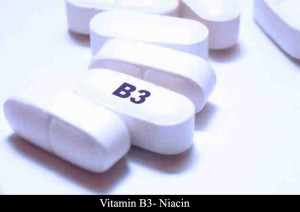Vitamin B3 has important functions in blood circulation, sex hormone, metabolism of protein and carbohydrate and functioning of nervous system. Deficiency of vitamin B3 causes pallegra. Vitamin B3 deficiency occurs in area where people eat maize as their basic food. Body can easily use fats and protein if consumption of vitamin B3 in diet is good.
Need of vitamin B3 in our diet-
Following are the reasons for having vitamin B3 in our diet-
1) It helps the body to produce energy by constantly using vitamin B3. As vitamin B3 is water soluble it is immediately flushed out of body once it is used.
2) Your body’s DNA is created by using vitamin B3. If consumption of vitamin B3 is less then it can cause genetic damage.
3) Regulation of blood sugar levels is another factor for the importance of vitamin B3 in our diet. Mostly the risk for type-1 diabetes is reduced if vitamin B3 is consumed in our diet. ‘Glucose Tolerance Factor’ (GTF) is the molecule that includes vitamin B3 which reduces risk of diabetes.
4) It decreases the risk of heart disease if vitamin B3 is included in diet.
5) Risk such as Alzheimer disease, cataracts are reduced. It has also helped in reducing total blood cholesterol level in individual’s body.
6) Efficiency for functioning of digestive system is increased.
Deficiency caused due to lack of vitamin B3-
Deficiency of vitamin B3 includes headache, fatigue, memory loss, poor appetite. These symptoms are due to minor deficiency of vitamin B3. Your body feels these symptoms because it does not have enough vitamin B3 to produce energy. But if deficiency of vitamin B3 is severe then it causes pallegra. Meaning of pallegra is ‘raw skin’. It is not an infectious disease. This disease is caused in area where skin is more exposed to sunlight. Pallegra leads to diarrhea, skin becomes scaly and cracked, dementia and may lead to death if not cured on time. Pallegra affected US between 1906 and 1940 killing over 100,000 people. Dr. Joseph Goldberger in 1914 was asked to investigate pallegra in south of country. In his investigation he found that south had more rate of pallegra than north. In his study he found that vitamin B3 was lacking in their diet. Pallegra can be treated by nutritional diet and by providing niacin supplements. Other neurological symptoms are memory loss, depression, sleeplessness and fatigue.
Pallegra is not found in developed countries today but it exist in some poor countries. It exist in countries where corn, rice, maize are staple food which contains very low level of vitamin B3. Experts says that high rate of pallegra is only in these countries due low intake of vitamin B3.
Disadvantages to our body due to high doses of vitamin B3-
Very high doses of vitamin B3 can overcome following symptoms but they can also be toxic to your body. High doses of vitamin B3 causes headache, dizziness, flushing of skin and can also lead to blurred vision. This blurred vision is due to thickening of macula and retina. This disease is called as maculopathy and is also due to excess doses of vitamin B3. It also leads to liver damage. Niacin can also cause hepatotoxicity. So it is recommended that dosage of niacin should only be taken under doctor’s supervision. But if consumption of niacin is through food then it is not known to cause adverse effect.
Who should take precaution?
People having kidney disease, liver disease should not take vitamin B3 doses. If you have scheduled a surgery then stop taking niacin at least two weeks before. People having low blood pressure should not take niacin because it can lead to sudden drop in blood pressure. People having gall bladder disease should take niacin as per doctor’s supervision. You should also take precaution if you are currently having the following medication-
1) Antibiotic, Tetracycline.
2) Anticoagulants because niacin makes effect of this medicine stronger which leads to increased risk of bleeding.
3) Alpha-blockers- In this case niacin can increase the risk of lowering blood pressure by making the effects of medication stronger.
4) Cholesterol lowering medication- Niacin makes the cholesterol lowering medication less effective hence these medications should be taken daily but at different timings.
5) Isoniazid(INH)- This medicine may cause deficiency of niacin.
Medicine such as Azathioprine, Fluorouracil, Levodopa and carbidopa, cycloserine may lower the level of niacin.
Recommended intake for Vitamin B3-
1) Recommended nutrient intake for infants and babies-
Infants 0-5 months should take 2 mg/day
Babies 6-11 months should take 4 mg/day
2) For children
1-3 years should take 2 mg/day
4-6 years should take 8 mg/day
7-9 years should take 12 mg/day
3) For adolescents
Boys 10-18 years should take 16 mg/day
Girls 10-18 years should take 16 mg/day
4) For adults
Men 19-65 years should take 16 mg/day
Women 19-65 years should take 14 mg/day
5) For elderly
Men greater than 65 years should take 16 mg/day
Women greater than 65 years should take 16 mg/day
6) For pregnancy and lactation
Pregnancy-18 mg/day
Lactation-17 mg/day
Important food sources of vitamin B3-
Food rich in protein can meet the requirement of vitamin B3 deficiency. Food such as pork, fish, beef, meat, nuts and whole grains contain more content of vitamin B3 in it. Peanut contains highest of 11.7 mg per 100g of niacin in it. Other sources of vitamin B3 are roasted turkey breast, mushroom, deer meat and fish such as salmon and tuna are also large source of vitamin B3. In plants like wheat and corn vitamin B3 is bound with sugar molecules hence reducing the bioavailability in it. Large use of liquid can also greatly reduce the content of niacin in it.
